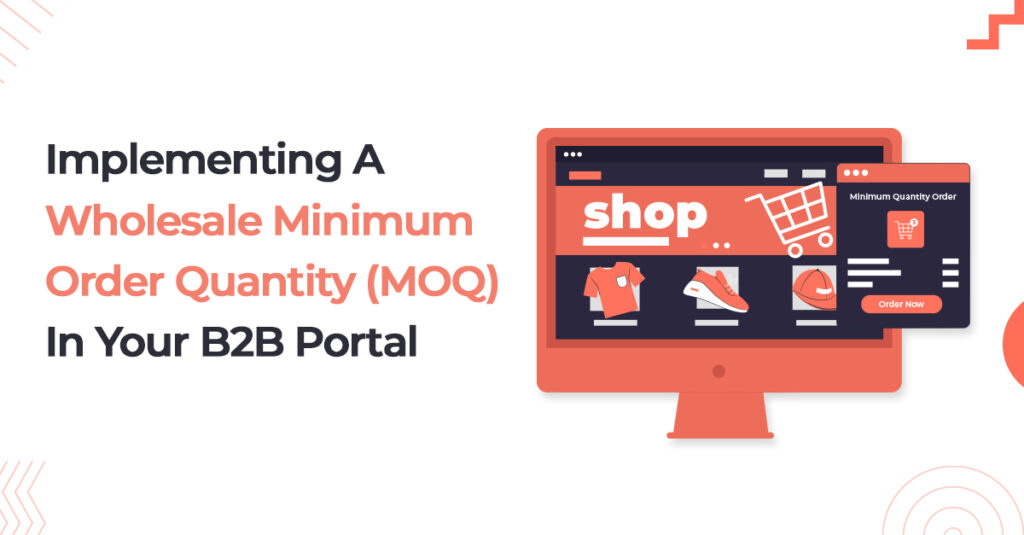For a successful business, having effective inventory management is a key determinant. Online wholesalers or retailers are always trying to keep the ideal balance between having enough stock for customers and not overstocking, which can result in economic losses and inefficiencies. One important element that significantly affects this balancing act is the idea of Minimum Order Quantity, or (MOQ).
Minimum Order Quantities affect both sellers and buyers in the B2B market. Also, implementing a wholesale Minimum Order Quantity (MOQ) in your B2B portal is an essential strategy for optimizing your business operations and gaining profit margins. So, whether you’re the one buying or selling, it’s really important to know how to use MOQ to your advantage. This blog post will explore how to effectively implement and manage MOQ in your B2B portal.
What is MOQ?
MOQ refers to the least amount of products a wholesale business owner is willing to sell in a single transaction. Suppliers set these MOQs to cover the costs of making and delivering the products. It also helps them to be sure there’s enough demand and prevent small businesses from selling at really low prices. This technique is quite straightforward and used by distributors worldwide.
It’s a strategic decision made by wholesalers and manufacturers to maintain profit margins, manage inventory efficiently, and cover the costs associated with large-scale transactions. MOQ is particularly vital in industries where products are sold at minimal markup or on small profit margins. In these industries, a significant amount of sales is needed to cover all the costs and make a profit.
To grasp the meaning of MOQ, let’s look at an example: A wholesaler says you have to buy at least 400 units of a particular product, this means that a retailer must buy at least 400 units of that product in one go. This threshold guarantees that the manufacturer can cover their costs of making the product and delivery expenses and still make a profit on the sale.
Understand MOQ Terms
Determining the right MOQ depends on several factors, including your production, operating, and shipping costs. There are two main approaches:
1. Higher MOQs: Suitable for products with expensive raw materials and longer production hours.
2. Lower MOQs: Ideal for products that are cheaper and easier to produce.
Benefits of MOQ for Wholesalers
Implementing MOQ in your B2B portal has numerous benefits:
1. Profit Margin Boost: Ensuring larger quantities in each order contributes to increased profit margins.
2. Serious Buyer Encouragement: Minimum order quantities attract committed buyers and retailers with long-term business objectives.
3. Bulk Sales Opportunity: Facilitates the sale of large volumes in a single transaction, streamlining the wholesale process.
4. Quick Inventory Turnover: Helps in swiftly moving and replenishing inventory, preventing stagnation of products.
How to Implement a Wholesale MOQ With B2BWoo
Implementing a wholesale Minimum Order Quantity (MOQ) by B2BWoo in your B2B portal significantly enhances inventory management and profitability of your business:
The MOQ feature provided by B2BWoo is a comprehensive tool designed to optimize the profitability and efficiency of wholesale operations. This feature allows businesses to set detailed and complex rules for MOQ. It’s tailored to ensure each transaction not only meets quantity requirements but also hits a minimum value, thereby optimizing profit margins.
B2BWoo offers a comprehensive and flexible set of Minimum Order Quantity (MOQ) rules, allowing your businesses to create multiple rules based on different criteria to customize their wholesale operations. Here’s an overview of these main MOQ rules:
Customizable MOQ Rules
- Role-based MOQ: This rule is based on user roles such as wholesalers, retailers, or VIP customers. As a business owner, you can set different minimum order quantities for each role, ensuring a tailored approach to different customer segments.
- Customer-based MOQ: As an owner, you can establish this rule for individual customers based on their buying habits or tier. The platform enables businesses to set different MOQs for different customers. It’s a great way to personalize the buying experience and manage your business relationships effectively.
- Category-based MOQ: With this rule, you can apply MOQs to entire categories of products available in your online store. This is useful for streamlining your bulk orders and also you can effortlessly set a minimum order quantity for any category for your customers.
- Product-based MOQ: This rule enables business owners to set MOQs for individual products. This can be particularly useful for managing the profitability of each transaction, especially for high-value or high-demand products.
Regular Review and Adjustment is Must!
MOQ should not be static. Regularly review and adjust your MOQ based on market changes, customer feedback, and business growth. Keep an eye on your competitors’ MOQ policies, as they can influence consumer choices and market dynamics.
Want to create a wholesale eCommerce portal with B2BWoo, the most complete WooCommerce B2B solution for getting started with wholesale eCommerce easily, affordable, and quickly. So book your demo now!
Conclusion
In conclusion, MOQ is mainly established to facilitate wholesalers in retaining long-term business strategies.
Implementing MOQ in your B2B portal is a smart move toward ensuring profitability and efficiency. The B2BWoo platform offers advanced tools for implementing Minimum Order Quantity (MOQ) rules in wholesale operations like setting MOQs at product, category, or user role levels, and defining complex MOQ rules.
By understanding your business needs, setting appropriate MOQ levels, and communicating clearly with your customers, you can leverage MOQ as a powerful tool for business growth.
